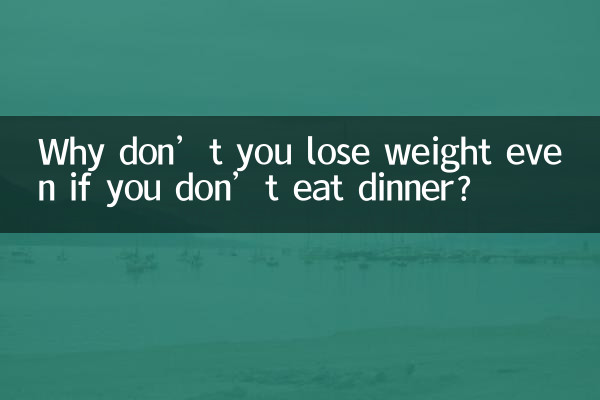Why don’t you lose weight even if you don’t eat dinner? Revealing weight loss misunderstandings and scientific methods
In recent years, weight loss has been a hot topic, especially the method of "skipping dinner" has been tried by many people. However, many people find that even if they insist on skipping dinner, they do not lose significant weight. This article will combine the hot data of the entire network in the past 10 days to analyze the reasons behind this phenomenon and provide scientific suggestions.
1. Hot topics related to weight loss on the Internet in the past 10 days

| Ranking | hot topics | Search volume (10,000) | Main discussion points |
|---|---|---|---|
| 1 | Skip dinner to lose weight | 120.5 | Effect disputes and backlash issues |
| 2 | basal metabolic rate | 98.3 | relationship with weight loss |
| 3 | 16:8 Light fasting | 85.6 | time window control |
| 4 | weight loss plateau | 76.2 | Breakthrough method |
| 5 | Gut flora and obesity | 62.8 | Latest research findings |
2. Why don’t you lose weight even if you don’t eat dinner?
1.Decreased basal metabolic rate: Skipping dinner for a long time will cause the body to enter "energy-saving mode" and reduce the basal metabolic rate, making it more difficult to consume calories.
2.Too much breakfast and lunch: Many people consume more calories during the day by skipping dinner, without reducing their total calories.
3.muscle loss: Long-term nutritional deficiencies can lead to the breakdown of muscle, which is the main tissue that consumes calories.
4.blood sugar fluctuations: Skipping dinner may lead to greater blood sugar fluctuations the next day, increasing the risk of overeating.
5.elevated cortisol: A state of hunger will stimulate the secretion of stress hormones and promote fat accumulation.
3. Comparison of scientific weight loss data
| How to lose weight | short term effect | long term effect | health risks |
|---|---|---|---|
| skip dinner | 1-2kg/week | Easy to rebound | high |
| balanced diet | 0.5-1kg/week | stable | low |
| Exercise to lose weight | 0.3-0.8kg/week | most stable | lowest |
| intermittent fasting | 1-1.5kg/week | More stable | in |
4. Healthy weight loss suggestions
1.Control total calories rather than number of meals: It is advisable to control the daily caloric deficit within 300-500 calories.
2.Balanced nutrition: Every meal should contain high-quality protein, complex carbohydrates, and healthy fats.
3.Moderate exercise: At least 150 minutes of moderate-intensity exercise per week to increase muscle mass.
4.Regular schedule: Guarantee 7-8 hours of sleep and regulate leptin and ghrelin balance.
5.manage stress: Reduce cortisol levels through meditation, deep breathing, etc.
5. Latest research findings
According to recent research data, intestinal flora is closely related to weight management:
| flora type | relationship with obesity | Improvement method |
|---|---|---|
| Firmicutes | Promote energy absorption | Reduce refined sugar |
| Bacteroidetes | Help with weight loss | Increase dietary fiber |
| Akkermansia | Improve metabolism | Supplement probiotics |
Conclusion:Simply skipping dinner is difficult to achieve the desired weight loss effect, and may even be counterproductive. The scientific method of weight loss should be to establish a sustainable healthy lifestyle, including a balanced diet, moderate exercise and good living habits. The latest research also shows that paying attention to intestinal health may be a new direction for weight management in the future.
Remember, weight loss is not a short-term sprint, but a long-term lifestyle change. Rather than going to the extreme of skipping dinner, it is better to learn how to eat every meal wisely so that the body can naturally reach a healthy weight with adequate nutrition.

check the details

check the details